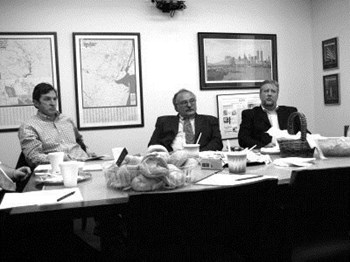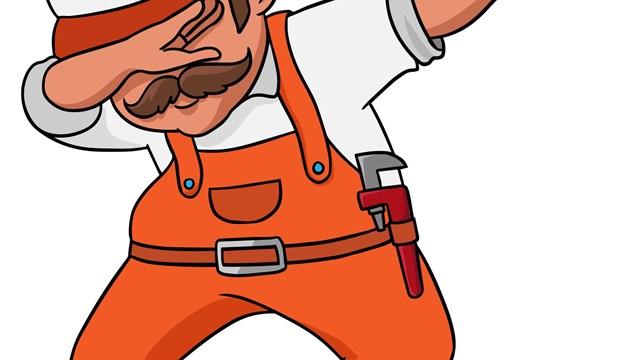
Superintendents are a lot more than just handymen—an important point learned at a roundtable discussion hosted by The Cooperator last month. Six representatives from three of New York City's seven superintendent organizations gathered for a roundtable discussion to share information and shed some light on their profession. From educational resources for supers to all the things residents don't know about their super's job, the attendees discussed a variety of topics in a lively and cooperative atmosphere.
Who knew a super was responsible for so much? All of the building's employees, professional development, communication with their management company, board and individual residents, the overseeing of the building's operational systems—including fire safety, the boiler and much more—all the way down to babysitting a neighbor's dog!
In the past, New York's supers' organizations didn't necessarily reach out and communicate with each other, and near-rivalries have existed between some groups. Now, thanks to networking opportunities like the recent roundtable, the organizations have opened the lines of communication and a spirit of collaboration is beginning to flourish between the groups.
In this spirit, representatives from the city's various superintendents' groups sat down with The Cooperator staff for an informative luncheon and "super" idea exchange.
The Nature of the Profession
At the table—which ironically was square, not round—sat seven representatives of the superintendent community: Matthew Hickey, a resident manager on Park Avenue since 1998, and chairman of the Hibernia Provident Society (HPS); Owen Rodgers, also a representative of HPS and a super for six years; Peter Roach, president of the Manhattan chapter of the New York Superintendents Technical Association (NYSTA) and a super on the Upper East Side—in the business for 19 years; Al Suarez, president of the Scandinavian-American Building Manager's Guild and a super for 15 years; his brother, Jimmy Brennan, vice president of the organization and a super for six years; Peter Grech, a super in the business for 31 years and the former president of NYSTA, who is currently working at a co-op on 46th Street; and Maria Vizzi, chairman of NYSTA's Vendor's Committee. Vizzi also works for Bronx-based Indoor Environmental Solutions (IES) and has collaborated with each of the supers' organizations over the years. She was the catalyst for the event, and attended the roundtable on behalf of the various groups.
One recurring theme of the roundtable was the difficulty of the superintendent's profession—a reality that was vividly illustrated when representatives from four other residential supers' and building managers clubs were unable to attend the event as planned because of issues at their buildings.
Those unable to attend were The Manhattan Resident Managers Club, The New York Building Managers Association, The Metropolitan Building Managers Club and The Emerald Guild.
More proof of the demands placed on supers came as the discussion was intermittently interrupted by phone calls from building employees seeking the advice of their supers.
Men of All Trades
First things first: what exactly is a superintendent, and how does a super differ from a resident manager? Our experts say the two terms are used interchangeably—but according to the union contract in effect in New York City, a super is officially considered a "resident manager" if he or she has six or more staff members working for him.
So once they've landed the job, how do these supers excel? All of the roundtable attendees agreed that open and honest communication with a management company and a building's board are imperative.
"You've got to have a good working relationship with management in order to do your job well, to be honest with you," said Suarez. "You need to keep the managing agent abreast of everything—you want to be on the same page. It helps the building run more efficiently."
How often should a super be in contact with his or her building's administrators? Again, it varies. According to the assembled experts, interactions with board members range from multiple times per day to just at monthly meetings. Some buildings prefer the super to work directly with the management company instead of speaking directly to a building's board.
And what about the relationship supers have with shareholders? The Cooperator posed the tough question of whether building residents sometimes overstep the bounds with their supers, taking advantage of the fact that supers usually live in the buildings they maintain.
"I find the majority of the shareholders in the building are respectful of our hours," said Suarez. "There are some that aren't—but that's the nature of the business. It's your job, and you have to treat it that way. Sometimes you have to get up two or three o'clock in the morning; that's your job. We all take pride in what we do."
Grech said that sometimes the line is crossed and that the super becomes nothing more than an ordinary babysitter. Brennan countered that if a resident asks a super for too much, it's still their job to comply. "I was brought up that there is no option of saying no," he said. "In my opinion, you have to be the exterminator, the plumber, the electrician, the shrink, the housekeeper—you name it. We're there to accommodate."
When asked about the common mistakes residents make that negatively impact their building, the supers pooled answers. Leaving doors open, losing keys, or giving too many people access to a unit were some of the most common issues—though roundtable attendees also told some horror stories of residents jumping out of windows and falling down elevator shafts, and building staff members allowing unauthorized people into the building.
The Nitty Gritty
Every super's experience is different, but many at the roundtable mentioned an important part of all their jobs: attention to detail. The bigger problems that arise for supers include lead paint issues, mold, asbestos, water quality, leaks, noise, in essence, the list can seem endless.
And as if they didn't have enough to look after, over the past 25 years the jobs of supers have changed drastically, giving them even more responsibilities. Laws concerning building safety and security have changed, and more certifications are required to work on building systems, like boilers. Laws mandating window guards and fire safety plans have put supers in charge of even more operational tasks. Some buildings even want their staff to be certified to perform CPR. The proliferation of security cameras means that someone needs to monitor what's being recorded.
Also, buildings are getting older, and with renovations come a lot more work for supers. When a renovation is under way, a super is responsible for overseeing the staff, controlling the noise and dealing with complaints from residents.
"We've taken on the role of project managers," quipped Grech.
The supers agreed that as real estate prices go up, residents are paying more and as a result are looking for more service from their supers.
"A lot more will be expected of us," said Rodgers.
"That's why these articles are good," added Vizzi. "It enlightens people as to what the role of a superintendent/resident manager is."
Resources and Education
There was a general consensus that the number one way the participating supers achieved their level of experience was on-the-job training. However, there are resources available to New York's superintendents for continuing education. Some of the supers' organizations themselves offer informative seminars on the profession, said Suarez.
"[Building supers] should join a club or organization, because that's where you begin to build up practical knowledge," said Grech. "You're with your peers, you feel comfortable and you can ask questions and get guidance. I think that's one of the benefits of joining associations. So it's not only for networking, but it's also, in a way maybe—therapy."
According to Hickey, it's always important to build more skills. More skills make a super more valuable to a building and better at his job.
Brennan agreed. "Joining an organization is key to obtaining practical knowledge because your licenses are one thing, and your book knowledge is one thing, but your practical, in-the-field knowledge is something completely, completely different."
Organizations like the New York Association of Realty Managers (NYARM) and the City of New York Department of Housing Preservation and Development (HPD) also offer seminars specifically for superintendents. SEIU Local 32BJ, the union which oversees superintendents, handymen, porters and other professionals, also provides practical course work.
Future Cooperation?
So after years of operating independently, without much contact between organizations, what inspired the supers' groups to get together for the roundtable?
"We're in this business together," said Suarez. "We all use the same contractors. We all know the same people. I'm not saying by any means that all these clubs should come together as one—you need your own identity." But, Suarez—himself a member of five different clubs—says "each one has something different to offer."
"It's a hidden profession…it is," beamed Brennan.
Crystal Proenza is associate editor of The Cooperator.






5 Comments
Leave a Comment